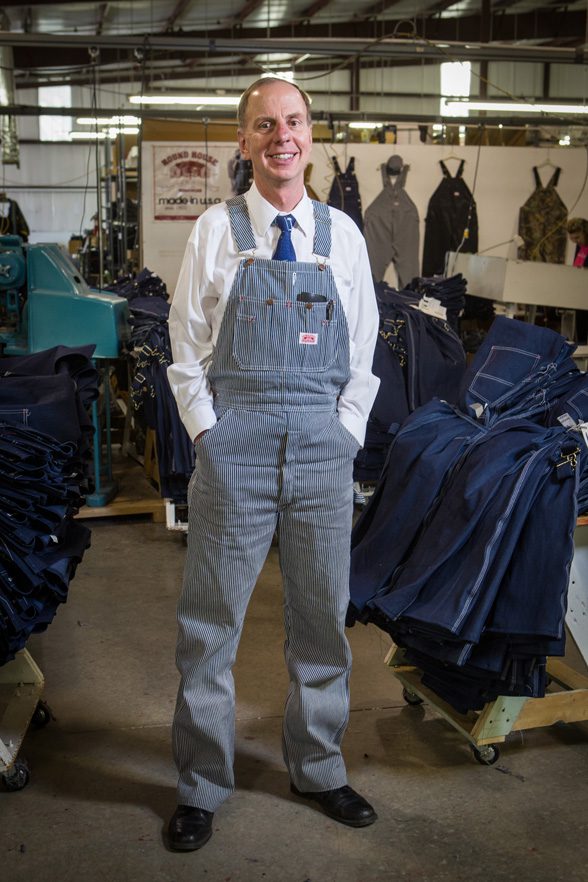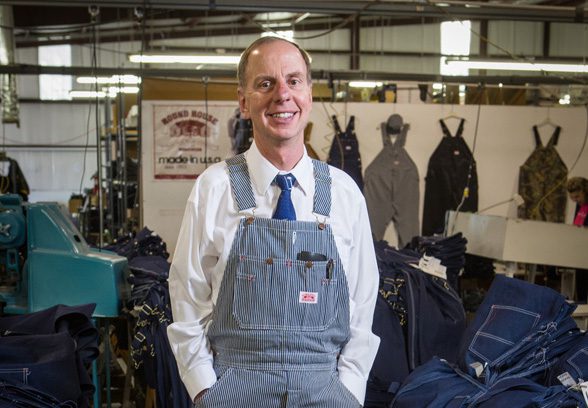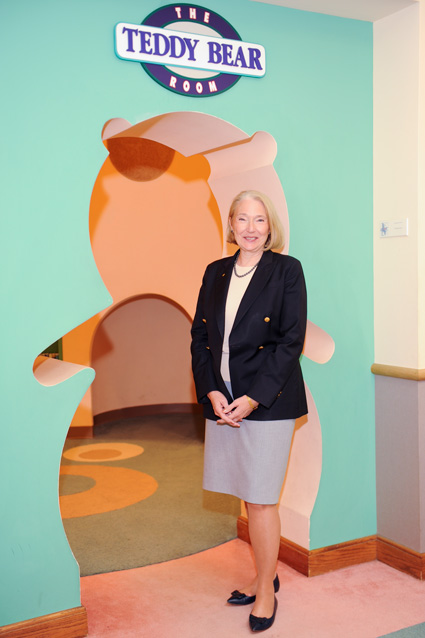
Photo by Brent Fuchs.
Layer upon layer of denim stretches across a 32-yard table. With steady precision, a worker makes a series of cuts, initiating a process that will eventually yield a sturdy pair of overalls – thousands of pairs, in fact.
In one of the offices adjacent to the factory sits the man in charge of it all. Tall, thin and exceedingly good-natured, he is not the first in his family to hold this position, nor is he likely to be the last.[pullquote]“As far as work clothing, we’re about it, so it gives us a real niche that way,”[/pullquote]
“When I was in high school, I was planning to be a chemical engineer,” says Jim Antosh, owner and president of Round House Workwear, which has manufactured jeans and overalls in Shawnee since 1903. “But then one summer I worked here and found out that I like manufacturing.”
Antosh majored in industrial engineering and earned his MBA from Oklahoma State University, all while planning to return to Round House. In 1978 he joined the company in a managerial role. In 1986 he became president, taking over for his father, Edward Antosh, who had purchased the company in the 1960s. Antosh’s son, David, currently serves as vice president, thus representing a third generation.
The vast majority of family businesses do not make it that far, Antosh says.
“There’s a myriad of reasons why they don’t make it,” he says. “But come around for our 200th, I think we’ll be here.”
David Antosh is equally optimistic.
“It seems like that’s kind of the way the family works,” he says. “We’ve always been involved in the business, and so even growing up I worked out at Round House doing different things.”
While the Antosh name imparts a sense of continuity, the last 112 years have brought many changes to the industry in general and the company in particular. Since Antosh took the reins, the NAFTA era has seen much of the American manufacturing base move overseas, leaving Round House the only company of its kind to carry on the tradition of “Made in the United States,” he says.
“As far as work clothing, we’re about it, so it gives us a real niche that way,” he says.
Perhaps ironically, this domestic emphasis has become an international selling point. Japan, for example, is a loyal and enthusiastic customer of the Round House product, which seems to embody notions of rugged individualism and traditional Americana, he says.
“They like that John Wayne-type image,” Antosh says.
Other changes have been more technological in nature.
Because individual sewing machines with their own small motors were not quite a reality in the 1910s and 1920s, one large electric motor was manipulated by pulleys on a shaft running down the table at which the workers sat, he says. Antosh recalls meeting a woman, now deceased, who worked for Round House in 1922, at which time this system would have been in place.
She appears in a period photograph hanging in a nearby hallway.
It is a type of history for which Antosh feels an obvious affection. He is constantly on the lookout for photos and other memorabilia from previous decades, with the hope of eventually establishing a museum.
But for now, a small gallery of photographs must suffice. It reflects a century of history – for Round House and, by extension, for Shawnee – with more recent photos showing celebrities from Donald Trump to Miranda Lambert bedecked in the company’s gear.
Meanwhile, the overalls continue their rounds across the factory floor, gradually taking shape through a combination of computerized technology and the same type of old-fashioned handiwork that was necessary 100 years ago – and, one assumes, will still be occurring under Round House’s roof 100 years from today.


























